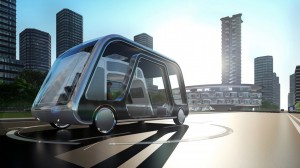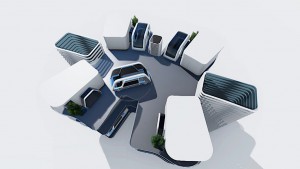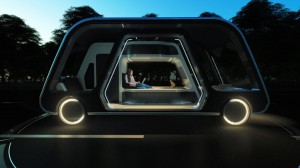Americans are traveling U.S. roadways with greater frequency than ever, setting new records for miles traveled each of the last three years. Automakers, looking to make those safer miles, are furiously working to develop the first fully autonomous vehicle.
The idea of a fully autonomous car is appealing. Tell the vehicle where you want to go, and then get comfortable with a book, watch a movie or even take a nap. Set it and forget it, if you will.
While that may seem like the next greatest thing, it’s not. That distinction belongs to the Autonomous Travel Suite (ATS).
The ATS is where hospitality meets functionality — for drivers.
(Ford partnering with Walmart on autonomous deliveries. Click Here for the story.)
Created by Toronto-based Steve Lee of Aprilli Design Studio, the ATS concept – and for now it’s just that – is essentially a self-driving hotel suite, complete with a sleeping area, bathroom, work space and small kitchen. All of that would be encased in a clear exterior that could be dimmed for privacy. Think autonomous Winnebago meets Sharper Image meets Ikea.
It would likely be powered by battery-electric motors or even hydrogen. Lee thinks the BEV model would require battery packs to be changed when running low, rather than being recharged. This could be done at roadside maintenance stations in a minimum amount of time.
That doesn’t even have to be a “radical” concept as Tesla CEO Elon Musk showed the world a few years back when he had a team replace the pack on a Model S in less than 10 minutes. The maintenance stations would also allow other tasks to be performed simultaneously, such as waste removal or water replacement.
The concept, which captured the Radical Innovation Award 2018, marries Lee’s lengthy experience in hotel architecture and design with a fascination with technology. The idea of an autonomous vehicle being just a car doesn’t fit Lee’s sensibility, especially if you’re going to be in it for any length of time.
“My point is that it’s not about the car industry because everybody is going to have an autonomous car anyway,” Lee said during a question-and-answer session after accepting the award.

The ATS is designed for six- to 10-hour trips and can link up with maintenance stations for battery replacements, waste removal, etc.
The ATS could be offered in difference sizes to meet the needs of who – or how many – is travelling. The entire process, start to finish, would be controlled an app on the user’s smart phone or tablet.
(Click Here for more about Kroger working with Nuro on a driverless delivery vehicle.)
“This is going to be better than the car you have,” he said. “It’s going to be more about the hospitality industry within the eight to 10-hour driving range, which is going to impact it.
“If it’s an eight- to 10-hour drive, you can’t just stay inside this small vehicle. You need a lot of things. You need furniture. You need a room. That’s why I think this project is going to be a spatial project that will be injected into transportation.”
Further adding to the convenience of the ATS, Lee believes that they will “dock” or “plug in” at a company that operates “Autonomous Hotels.” The hotels would be designed to park the ATS in a manner that is more like docking, where once it arrives, it would open to a larger, more conventional-looking hotel room that enjoys all of the advantages of a regular hotel such as a pool, restaurant, fitness facility, meeting rooms, etc.

The ATS can dock at a hotel, allowing the user to connect to a larger, more conventional hotel room.
The ATS could also have maintenance performed while there as well, such as recharging the battery, cleaning, etc.
Sounds fantastic, right? Well, maybe not. An overwhelming number of studies reveal that a wide majority of Americans do not trust autonomous vehicles. A self-driving hotel room? That’s a much bigger leap.
However, Lee is ever the optimistic, suggesting that the autonomous technology is expected to arrive by 2021 so the hold up will be other parts of the infrastructure and the hotels of course. He notes that it takes three to five years to plan and build a hotel, and this one is more complicated that the average Ramada Inn.
(Skip the tip: Domino’s, Ford team up to test driverless pizza delivery. Click Here for the story.)
So when can travelers hope to try out the mobile hotel experience? “I think it will happen very soon,” he said.


